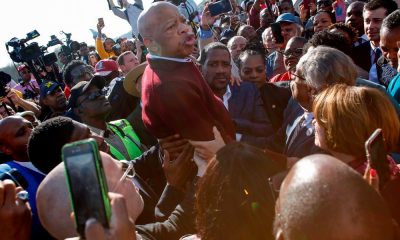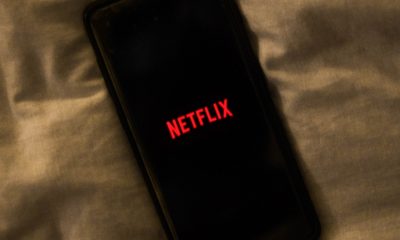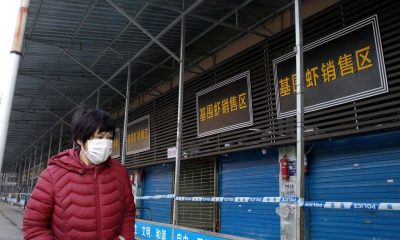World News
'I up-played it': Donald Trump falsely claims he didn't downplay coronavirus pandemic
The president insists during rambling town hall that he ‘up-played’ the crisis and believes the virus will go away because of ‘herd mentality’ * Coronavirus – latest updates * See all our coronavirus coverageDonald Trump falsely claimed he did not downplay the coronavirus pandemic at a town hall Tuesday night, saying, “Actually, in many ways, I up-played it, in terms of action.”His remarks came in response to an uncommitted voter at the ABC News event, who asked Trump why he would “downplay a pandemic that is known to disproportionately harm low-income families and minority communities”. The president said he did not minimize the threat of the virus: “My action was very strong. I’m not looking to be dishonest. I don’t want people to panic.”Trump’s misleading response comes one week after the investigative journalist, Bob Woodward, revealed that the president explicitly admitted to downplaying the virus in interviews with him. Woodward has reported that, although Trump’s national security adviser gave him a “jarring” warning in January about the virus, calling it the “biggest national security threat” of his presidency, Trump continued to understate the risks in public statements.On 27 February, Trump said publicly: “It’s going to disappear. One day – it’s like a miracle – it will disappear.” On 9 March, he compared it to the flu, tweeting, “Nothing is shut down, life & the economy go on”.By 19 March, Trump declared a national emergency. But at the same time, he told Woodward: “I wanted to always play it down. I still like playing it down, because I don’t want to create a panic.”In an interview with CNN on Tuesday, Bob Woodward said of Trump: “I don’t know if he’s got it straight in his head, to be honest, what is real and what is unreal.”At the ABC town hall, the president also said the virus would “go away”, with or without a vaccine. This would happen because of “herd mentality”, he said. It is unclear whether he meant heard immunity, because he repeated the phrase several times.“It would go away without the vaccine, George,” he told ABC journalist George Stephanopoulos. “With time it goes away. And you’ll develop like a herd mentality. It’s going to be herd developed, and that’s going to happen. That will all happen.”> TRUMP: It is going away > > STEPHANOPOULOS: Without a vaccine? > > TRUMP: Sure. Over a period of time > > S: And many deaths > > TRUMP: It's gonna be herd developed pic.twitter.com/dtJRE7XwFX> > — Aaron Rupar (@atrupar) September 16, 2020Trump also responded to the voter’s question by repeating misleading claims about his early travel restrictions during Covid, falsely calling them “bans” on China and Europe.The president made other questionable claims about the virus on Tuesday night. Asked by one uncommitted voter why he doesn’t do a better job promoting mask usage and why he doesn’t wear masks more often, the president again cast doubts on the scientific consensus of his own administration, which has strongly urged the use of face coverings.“There are people that don’t think masks are good,” Trump said, adding that masks cause problems for “waiters”.Asked why he doesn’t support a national mask mandate, the president suggested the voter could ask that question to Democrats and to his rival Joe Biden, saying, “He didn’t do it. They never did it.” It’s unclear what the president was referring to, given that the former vice-president is not currently an elected official and has no authority to implement any mask policy.The president further defended his early praise of China’s handling of Covid-19 at the start of the pandemic. He said he trusted Xi Jinping, the Chinese leader, at the time: “He told me that it was under control, that everything was and it turned out to be not true.”On the campaign trail, Biden has repeatedly criticized the president for misrepresenting the threat of the virus at the start of the crisis. At a recent event in Michigan, the Democratic nominee said: “He knew how deadly it was. It was much more deadly than the flu. He knew and purposely played it down. Worse, he lied to the American people. He knowingly and willingly lied about the threat it posed to the country for months.”The president has had a number of campaign events that have defied state orders on Covid, with large crowds indoors, not practising social distancing.Biden will take questions from voters on Thursday when he participates in a televised town hall hosted by CNN. Trump and Biden will meet for the first presidential debate at the end of September.
World News
Benzinga Cannabis Hour: Wielding Hemp To Offset Climate Change
This week's Benzinga Cannabis Hour featured Last Prisoner Project's Steve DeAngelo; Hoban Law Group's Bob Hoban; and The People's Dispensary's Christine Delarosa (link to video below).Co-hosts Patrick Lane and Javier Hasse guided the conversation across a wide variety of topics. Here's a breakdown of what was discussed.Steve DeAngelo, Founder, Last Prisoner ProjectSteve DeAngelo is perhaps one of the most renowned leaders in the sector. Touted as the "Father of the Cannabis Industry," the LPP founder is indeed a multihyphenate: speaker-activist-advocate-entrepreneur-educator.He kicked off the conversation by making a case for a hemp-based economy."We can wear hemp clothes. We can eat hemp foods. We can start driving this hemp economy forward," he said. Why? The environment depends on it."For every hectare of hemp that we harvest, we sequester 22 tons of atmospheric carbon," he said. "If we make hempcrete out of that harvested hemp, then the hempcrete — as it dries — will sequester additional carbon, and once harvested, that industrial hemp crop can be used to produce anything that's currently made from cotton, or petroleum or trees."In DeAngelo's view, a hemp-based economy coupled with a plant-based diet are the two "most immediate changes" that consumers can make in their lives in order to forestall climate change.DeAngelo also stressed the importance of LPP's mission: decarcerating cannabis. The organization provides a variety of services to those who have been incarcerated with cannabis criminal records, including job training and housing so they're not forced into circumstances that may lead them back to prison."Not many Americans realize it, but we incarcerate a larger proportion of our population [more] than any country on Earth — yes, including China, North Korea, Russia etcetera," DeAngelo said. "Five percent of the world's population, we have 25% of the world's prisoners. That's a travesty in 'the land of the free' and 'the home of the brave.'" Bob Hoban, Founder & President, Hoban Law GroupHoban provided viewers with a flavor of what his firm does best. Turns out, there are a lot of focal points. The law veteran works personally with about six or seven different clients throughout the course of the year."Most of what I do now is provide them strategy and advice," he says. He also serves as interim or active CEO to a number of different companies, aiding them in policy, strategy and investment: "Usually my last job is to replace myself."Among Hoban's practice areas include regulatory divisions around hemp and marijuana; tax and securities; as well as intellectual property, trademarks and patents. "Finally there's our global practice, which is really a hodgepodge of great lawyers who understand this space and other jurisdictions," he said.What's Hoban's biggest challenge? Finding lawyers in other jurisdictions that want to work in the cannabis space."When you approach them, they say 'Cannabis? I'm not a criminal defense attorney… that's not a real industry,'" he said. "You show them the numbers and walk through it, and then their eyes open up."Christine Delarosa, CEO & National Co-Founder, The People's DispensaryFlanked by Christmas lights (because "it's 2020… it's a dumpster fire"), Delarosa provided insight into her unique story. A pulmonary embolism from undiagnosed lupus in 2010 led her to rely on pills and opioids for treatment.By 2015, Delarosa still had trouble walking and coping with the pain. She asked: "What happens to me when I'm 60? How many pills do I take… just to be able to get up out of bed?"That's when she began looking for alternatives and discovered CBD and cannabis.A Women Grow conference "changed my world," she said. She found her regimen, stopped taking pills and has been in remission for five years thanks to cannabis treatment.The experience inspired her to launch The People's Dispensary and help others like her. "It was so important to me to make sure that people in general, but specifically people of color who have been demonized around this drug and are afraid of it, understand that this actually is an alternative way to treat your illness that's holistic, and doesn't put you addicted to opioids," she said. "And that's how we started."The Benzinga Cannabis Hour is produced every week and brings together top executives, entrepreneurs, and experts from all corners of the cannabis industry. Each show features three or more guests from a broad spectrum of expertise in cannabis.To tune in, stream the episode below; click subscribe on the official Benzinga YouTube channel; or visit BZCannabisHour.com.Cannabis Hour is also published on most major podcasting platforms, including Spotify, Google Podcasts, Breaker, Pocket Casts, and more.See more from Benzinga * Michigan Senate Passes Bills Allowing Cannabis Records To Be Expunged * WeChat Avoids Ban After Federal Judge Blocks Trump Executive Order * TikTok Ban Averted As Trump Gives Deal With Oracle, Walmart His 'Blessing'(C) 2020 Benzinga.com. Benzinga does not provide investment advice. All rights reserved.
World News
With Daily Infections Hitting a Record-High, Critics Say the U.K. Hasn’t Learned From Its Mistakes
LONDON — Britain bungled its response to the coronavirus the first time around. Now many scientists fear it’s about to do it again.
The virus is on the rise once more in the U.K., which has recorded almost 42,000 COVID-19 deaths, with confirmed daily infections hitting a record-high 6,634 on Thursday, though deaths remain far below their April peak.
The surge has brought new restrictions on daily life, the prospect of a grim winter of mounting deaths — and a feeling of deja vu.
“We didn’t react quick enough in March,” epidemiologist John Edmunds, a member of the government’s scientific advisory committee, told the BBC. “I think we haven’t learnt from our mistake back then and we’re, unfortunately, about to repeat it.”
The U.K. is not alone in seeing a second wave of COVID-19. European countries including France, Spain and the Netherlands are struggling to suppress rising outbreaks while limiting the economic damage.
But Britain’s pandemic response has revealed a roster of weaknesses, including unwieldy government structures, a fraying public health system, poor communication by Prime Minister Boris Johnson’s government and a reluctance to learn from other countries.
“We have to ask why a country with such reputed health and intelligence institutions has been so incapable of combating the COVID pandemic,” Gus O’Donnell, the former head of Britain’s civil service, said Thursday.
He said British politicians had “over-promised and under-delivered.”
Like many other countries, apart from Asian nations hit by past outbreaks of the SARS and MERS coronavirus illnesses, Britain was unprepared for the pandemic.
Britain quickly approved a test for COVID-19, but lacked the lab capacity to process those tests. That meant attempts to locate, test and isolate the contacts of every infected person soon foundered.
By the time the government ordered a nationwide lockdown on March 23, the virus was out of control. Supplies of protective equipment to hospitals and nursing homes soon ran dangerously short.
Luca Richeldi, an adviser to the Italian government on COVID-19, told a committee of British lawmakers this week that he was “shocked” at the slow U.K. response while Italy was “living a collective tragedy.”
“I had the impression that in general what was happening in Italy was not really perceived as something that could happen in the U.K.,” he said.
Critics say the government’s insistence on going its own way — epitomized and exacerbated by the U.K.’s departure from the European Union in January — has hobbled its response.
The U.K. spent months trying to develop a contact-tracing smartphone app from scratch before abandoning it and adopting an Apple- and Google-developed system already used in many other countries. The app was launched in England on Thursday — four months late.
There were some successes. Britain’s state-funded health-care system coped; its hospitals weren’t overwhelmed. But that was achieved at the high cost of postponing routine surgeries, appointments and screening for cancer and other diseases.
Like some other countries, the U.K. released elderly patients from hospitals back to nursing homes without testing them for the virus. Thousands died as a result.
Summer brought a respite as the tide of cases receded. It also brought a push to revive the battered economy. Johnson’s Conservative government urged workers to return to offices to prevent city centers becoming ghost towns and tempted people back to restaurants with discounts. It worked economically, but it may also have helped the virus to return.
Given Johnson’s back-to-normal boosterism, there was inevitable confusion when he reversed course this week and announced that people should continue to work from home after all. That came alongside new restrictions including a 10 p.m. curfew in bars and restaurants and expanded face-mask requirements.
Critics say the government was slow to advise wide use of face masks, just as it was slow to require quarantines for people arriving from abroad.
But the key failing, many believe, is in the coronavirus testing system.
Britain has rapidly expanded testing capacity, to some 250,000 a day, and set up a test-and-trace system with thousands of staff.
But when millions of U.K. children went back to school this month — and some came home with coughs and fevers — demand for tests surged to around 1 million a day. Many people found they could not book a test, or were sent hundreds of miles away.
“I don’t think anybody was expecting to see the real sizable increase in demand that we’ve seen over the last few weeks,” Dido Harding, who heads the program, told lawmakers this week — although many scientists and officials had predicted exactly that.
Headed by Harding, a former telecoms executive married to a Conservative lawmaker, the test-and-trace program is largely run by private companies including outsourcing firm Serco, using a call-center model to reach contacts and tell them to self-isolate. The system is only reaching about 60% of infected people’s contacts, and research suggests many people who are asked to self-isolate don’t comply.
“The whole thing is hopelessly inefficient,” said Martin McKee, professor of European public health at the London School of Hygiene and Tropical Medicine, who said good contact tracing is like detective work.
“It’s as if we decided to put (fictional detectives) Miss Marple or Father Brown in a hotel room with a single telephone line and told them to solve the murder,” he told The Associated Press.
Some of Britain’s troubles aren’t unique. Dutch local health authorities are struggling to keep up with demand for contact tracing, and in some hard-hit regions infected people are being asked to inform their own contacts. In Madrid, site of one of Europe’s fastest-growing outbreaks, it can take more than a week to get test results. In France, confirmed new cases have topped 13,000 a day and the virus is resurgent in nursing homes.
An apparent exception is Italy, the first Western country hammered by the virus, where a strict 10-week lockdown largely tamed the outbreak. Even now, Italians’ compliance with mask-wearing and social distancing is strong, and cases average around 1,500 a day.
In Britain, criticism of Johnson’s leadership is growing.
Johnson is all too aware of the danger of the coronavirus — it put him in intensive care in April. But he is an instinctively laissez-faire politician who likes broad brushstrokes, simple slogans and optimistic messages.
In March, Johnson said Britain could “send the virus packing” in 12 weeks. Earlier this month, he said he hoped things would be back to normal by Christmas. This week he acknowledged that new restrictions will be in place for six months.
He said he was “deeply, spiritually reluctant to make any of these impositions” — but many scientists believe stronger measures will inevitably be needed, especially if the test-and-trace system doesn’t improve.
Meanwhile, polls suggest support for the government’s handling of the crisis is falling, and authorities worry compliance is fraying.
Unease is growing among formerly loyal allies of the prime minister.
The Spectator, a conservative newsmagazine that Johnson used to edit, summarized the past six months as “disorder, debacle, rebellion, U-turn and confusion.”
“Where’s Boris?” the magazine asked on its cover.
——
Aritz Parra in Madrid, Michael Corder in Amsterdam, Thomas Adamson in Paris and Nicole Winfield in Rome contributed to this story.
World News
Malaysia's Political Jockeying Is a Distraction
(Bloomberg Opinion) — Once a bastion of political stability in a troubled region, Malaysia faces the prospect of its third government in little more than six months. A war of attrition over the premiership is the last thing the country needs.Gross domestic product shrank 17.1% in the second quarter, the worst performance in East Asia, and deflation is taking root. Prime Minister Muhyiddin Yassin came to power in March, just as the pandemic began rippling through the region. His support never looked very solid. That shaky backdrop has opened the door for the latest leadership challenge. On Wednesday, Anwar Ibrahim, a one-time establishment insider now heading up the opposition, shocked investors by asserting he has more than enough votes in parliament to command a majority and oust Muhyiddin. While Anwar’s announcement hasn’t been matched by public declarations of support, it was jarring enough to push stocks lower and nudge the currency to a two-week low. The premier says he isn't going anywhere and is focused on trying to contain Covid-19 and lift the economy out of a historic recession — effectively challenging Anwar to put up or shut up. There’s no denying Anwar has come close to the apex of power in Malaysia in the past, only to stumble, or get tripped, before the finish line. With an abundance of salon intrigue, the political class at times appears out to lunch on basic governing needs. Within Muhyiddin’s camp, backers have engaged in public spats about who gets to contest electoral districts and which supporters get plum public-sector jobs. Four stimulus packages have been passed mostly by decree; other critical things like raising the debt ceiling need legislation. Demonstrating a working majority is critical, but Muhyiddin's is so thin he appears wary of risking a public vote.It wasn't always this way. For most of its six decades of nationhood, the country was able to steer a middle ground in Southeast Asia. One coalition ruled for most of that time and returned at regular elections. By contrast, neighboring Indonesia has been prone to epic crackups that degenerate into communal violence. In Thailand, the military regularly installs and sacks cabinets, and Ferdinand Marcos in the Philippines was able to seize power and rule as an autocrat for years before getting overthrown. Now, power in Malaysia risks falling into a disturbing pattern: a few lawmakers switch sides and unseat governments outside of elections.That’s what Anwar's gambit would mean. Neither he nor Muhyiddin want the stalemate broken by the monarch — whose role is largely ceremonial — dissolving parliament and calling a fresh election. Each man worries that he would lose. Provincial balloting this weekend in Sabah is the next potential trip wire; the northeastern Borneo state is one of the few local administrations not allied to Muhyiddin's bloc. The return of the state government would be seen as a rebuff of the prime minister and, in theory, a plus for Anwar.The fractured nature of the opposition is also part of the story here. Before March, Anwar looked on course to assume the premiership later this year, such was the gentleman's agreement with then-Prime Minister Mahathir Mohamad. The two had history: Back in the 1990s, Anwar was also heir apparent to Mahathir, when both held office under a different political grouping, the Barisan Nasional, which had run the country since independence. But Anwar fell out with Mahathir and was jailed. The two men reconciled and united to defeat Barisan, which they claimed had succumbed to graft. Najib Razak, the last Barisan leader to occupy the premier’s job, was convicted and sentenced to prison for his role in the 1MDB saga. (Najib has appealed.) The terms of the Mahathir-Anwar peace treaty were that Mahathir, now in his 90s, would stand aside for Anwar after a few years. They could never fully reconcile, however. Their supporters split, enabling Muhyiddin to ascend. Anwar is on the outside wanting desperately back in; Mahathir says he'll wait and see how things pan out.This isn't just a storm within the ethnic Malay community, which has long formed the backbone of politics and policy. The region has much at stake in Malaysian stability. The nation is a major exporter of electronics and tied intimately to the global economic cycle. It sits astride the vital sea lanes of the Straits of Malacca and is one of the claimants on tracts of the South China Sea.Consistency and continuity count for a lot in such a diverse corner of the world. Unfortunately, these virtues tend to get noticed only once they are gone. Soon after Muhyiddin was installed in March, I wrote that Malaysia's politics had come to resemble the divisions over faith, ethnicity and urban-rural cleavage that characterized Brexit and Donald Trump. Malaysia can do better. Considering his reputation as a reformer and champion of civil society, so can Anwar.This column does not necessarily reflect the opinion of the editorial board or Bloomberg LP and its owners.Daniel Moss is a Bloomberg Opinion columnist covering Asian economies. Previously he was executive editor of Bloomberg News for global economics, and has led teams in Asia, Europe and North America.For more articles like this, please visit us at bloomberg.com/opinionSubscribe now to stay ahead with the most trusted business news source.©2020 Bloomberg L.P.
-
 Business2 months ago
Business2 months agoBernice King, Ava DuVernay reflect on the legacy of John Lewis
-
World News2 months ago
Heavy rain threatens flood-weary Japan, Korean Peninsula
-
 Technology2 months ago
Technology2 months agoEverything New On Netflix This Weekend: July 25, 2020
-
Finance4 months ago
Will Equal Weighted Index Funds Outperform Their Benchmark Indexes?
-
Marketing Strategies9 months ago
Top 20 Workers’ Compensation Law Blogs & Websites To Follow in 2020
-
 World News8 months ago
World News8 months agoThe West Blames the Wuhan Coronavirus on China’s Love of Eating Wild Animals. The Truth Is More Complex
-
Economy11 months ago
Newsletter: Jobs, Consumers and Wages
-
 Finance10 months ago
Finance10 months ago$95 Grocery Budget + Weekly Menu Plan for 8

